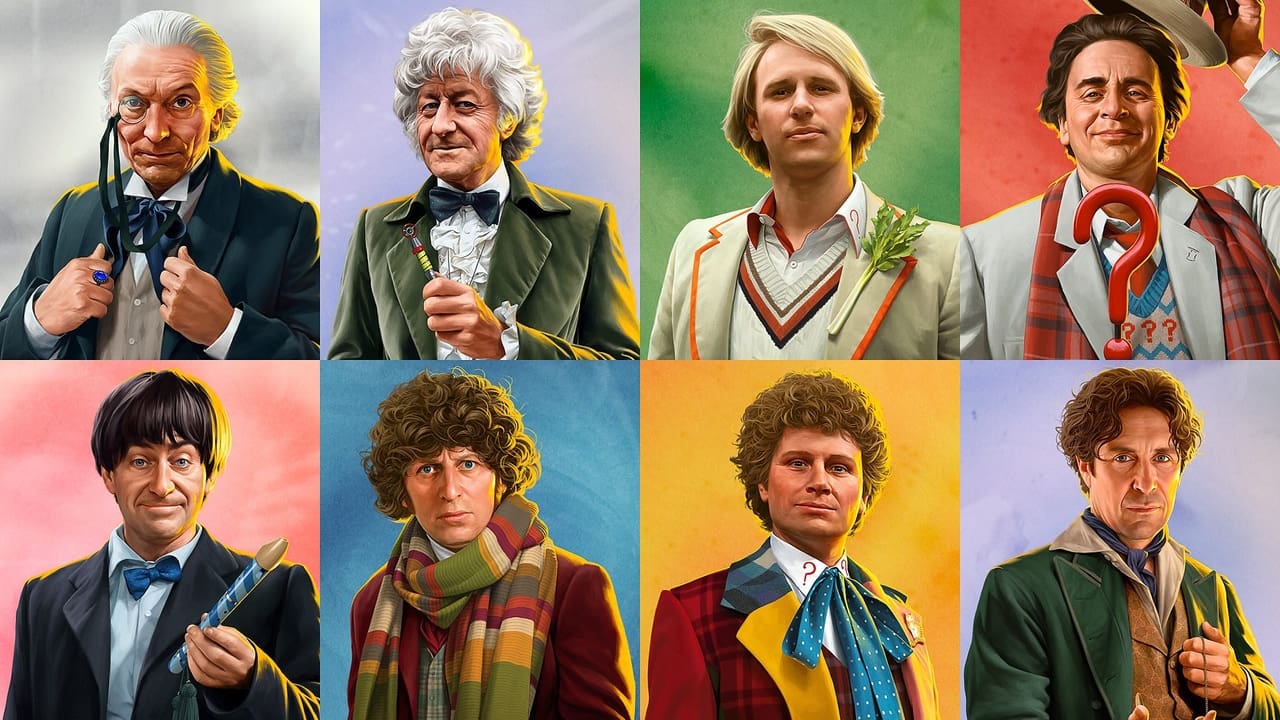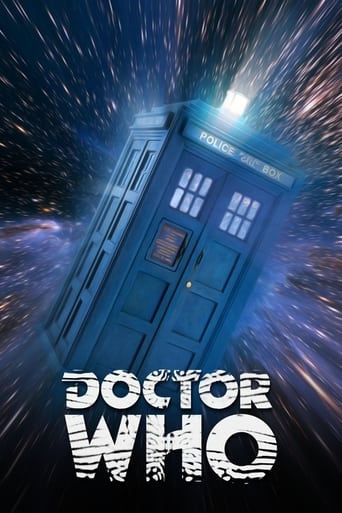

Not even bad in a good way
... View MoreIt’s fine. It's literally the definition of a fine movie. You’ve seen it before, you know every beat and outcome before the characters even do. Only question is how much escapism you’re looking for.
... View MoreIt is an exhilarating, distressing, funny and profound film, with one of the more memorable film scores in years,
... View MoreIt really made me laugh, but for some moments I was tearing up because I could relate so much.
... View MoreThis classic series of Doctor Who is awesome with each era bringing something new to the Legacy of the. See were it all started with An Unearthly and see where is ended with Survival its a hell of a ride lets break down the eras.Now the first two eras i find really hard to watch due to most of the episodes being missing. However the stories i have seen i really enjoy Dalek Invasion of Earth is incredible and The Tenth Planet is awesome. With the second doctor i enjoyed The Invasion and Tomb of the Cybermen two great cybermen episodes who are my favourite villains now have seen 3rd Doctor onwards in its entirety and its Classic so lets break down then Eras.The Jon Pertwee era on Doctor Who such a classic era and a great part of Doctor Who history Pertwee plays this role beautifuly and this for me is when Doctor Who feels Dr Who unlike the two era's that came before. This era introduced alot of classic monsters that would be remembered by Dr Who fans forever like the Sea Devils, Silurians and the Sontaran which had there first appearance in The Time warrior. This era is also when I first saw the Ice Warriors in Curse and Monster of Peladon such great episodes now there some episodes I don't like for example the Green Death isn't brilliant and I've never really enjoyed Invasion of the Dinosaurs. This era also introduced two of my characters in the whole show the first one being The Master a brilliant villian in Dr Who history and his relationship with the Doctor is always brilliant. The other being Omega who was in The Three Doctors such a brilliant character and has a great backstory and such a great part of Dr Who law this is a character I want back in the New series and I prefer his look in this over his look in the 5th Doctor era. My favourite episodes in this era are definitely the three Doctors and the sea Devils which are just classic Dr who and episodes that all fans must see in my opinion. I also like that fact the Dr is stranded on earth during his era didn't think it would work but I love it and him for Unit his just awesome and makes for some really good stories.The Tom Baker era of Doctor Who my second favourite era in Classic Who and one of my favourite Doctors. This era has some of the best stories in Doctor Who history like City of Death, Pyramids of Mars and Deadly Assassin just to name few. However I think the best story in this era is definitely Genesis of the Daleks this story is just perfect and should be watched by any doctor who fan it's introduces one the best villains in tv history in Davros the creater of the Daleks such a great and interesting character and any scene with him and the Doctor is just pure gold and down Doctor Who's best moments. Davros isn't the only great villian in this era though Sutekh in Pyramids of Mars is incredible and really want him back in NuWho and season 13 is my second favourite season in Classic Who. I also really like the Key to Time season very enjoyable season. However there are some stories I'm not a fan of like Underworld and Meglos very disappointing stories in my opinion and ones I probably won't revisit that often. This era introduces me to my favourite companion in the Classic Run Romana II played by Lalla Ward. I also want to talk about Logopolis which is one of my favourite and I think Tom has the most interesting regeneration in my opinion.My favourite era in Classic Who is definitely the Peter Davison years this was the era In classic who I watched from beginning to end and loved it all now there are some episodes that aren't perfect like Time Flight and Warriors of the Deep but there some of favourite stories in all of Dr who In this era like Earthshock being my favourite Cyberman story of all time and Caves of Androzani being my favourite episode from the classic era. This era also some of my favourite villains introduced like the Tellaliptals in The Visitation and also the return of Omega in Arc of Infinity which is great. Fantastic era all round and Davison remains my favourite Classic Dr.The Colin Baker era definitely the most underrated era of Doctor Who in my opinion I personally like this era and I really Colin Baker as the Doctor think he played it really well I dont think every episode is perfect I'm not a massive fan of Time Lash and Twin Dilema has some issues. But there are some great stories in this era I love Vengeance on Varos and The Two Doctors. And trail of a Timelord, Revelation of the Daleks and Mark of the Rani are great as well. However my favourite story is definitely Attack of the Cybermen such a great story.The Sylvester McCoy era definitely my least favourite era in Doctor Who and still my least favourite Doctor this era has some really bad stories like The Happiness Patrol and my least favourite Cybermen story in Silver Nemesis and Ghost Light is just plain weird. However there are some great moments in this era and some stories I really like for example I love Survival and Remembrance of the Daleks and I really enjoy Curse of Fenric and Battlefield I also think Time and Rani is very underrated and one of my favourite episodes in this era. This era did also introduce one of favourite companions in Ace such a badass character and loved were her story going but still there just are alot of flawed stories and sometimes I'm not a fan of how he played the Doctor although he does have some great moments just a flawed era overall.Verdict 9/10 great piece of British Tv not all eras are perfect but alot of fun to watch and Dr Who is still my favourite show
... View MoreDoctor Who is one of, if not the, most original TV show to date. It introduces the concept of the Doctor, a two-hearted Time Lord, who uses a TARDIS to travel through time and space. As in, anywhere. Literally.I cannot begin to describe how much this series has affected my life, and I cannot recommend it enough to those who have not seen it. There are hundreds (and I'm not over exaggerating) of brilliant episodes, as diverse from each other as Marmite is from honey. A few of these are:An Unearthly Child, The Dalek Invasion of Earth, Doctor Who and the Silurians, The Tomb of the Cybermen, Inferno, Ark In Space, Genesis of the Daleks, Robots of Death, The Keeper of Traken, Frontios, the Caves of Androzani, The Trial of a Time Lord and The Curse of Fenric: to name a few. This series should definitely by watched by any fan of Sci-Fi, Fantasty, Horror, Drama, Soap Opera or anything else.
... View MoreDoctor Who was my childhood. This show was, and still is, awesome. Right from the start, it was set apart from sci-fi shows at the time. This show was originally intended to be educational. But all that changed one fateful day in 1963. Yes, that's right, I'm talking about... the Daleks.These monsters were one of the few things from sci-fi that could illicit pure, unadulterated terror in me. Other monsters eventually cropped up over the years, like the Cybermen, Sontarans, Silurians, Sea Devils, the Master, the list goes on...In short, there is a reason this show has spawned countless spin- offs, a TV movie, and has lasted for 50 years.It is because it is a staple of British television. Even cancellation couldn't stop this gem.After 16 years in development hell, barring the aforementioned movie, Doctor Who returned.
... View MoreDoctor Who is the greatest series ever. I guess the reason why I love this show is because it is lots of fun as it take a story any place and any time period and make it work. That is why the classic series is so loved and that is why there was a lot of demand for it to come back in 2005. To the naysayers of Doctor Who, it is their loss and their problem why they do not get the appeal of Doctor Who. It is their problem and frankly it should never be mine and watching Doctor Who is the best viewing decision I have ever made.It is often been said that Doctor Who could easily run forever (notwithstanding the gap between the "classic" and "new" series). That is because flexible in its format and it is that flexibility is why Doctor Who aficionados always stick with Doctor Who because it is worth sticking around for.
... View More